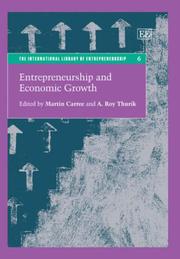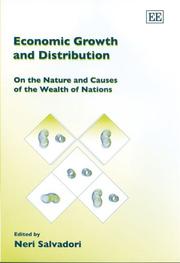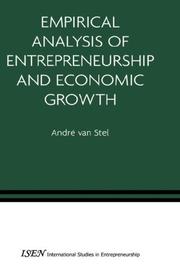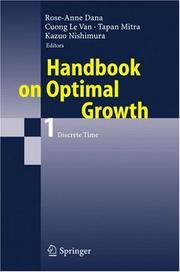| Listing 1 - 10 of 23 | << page >> |
Sort by
|

ISBN: 9780691122298 0691122296 Year: 2006 Publisher: Princeton, N.J. Princeton University Press
Abstract | Keywords | Export | Availability | Bookmark
 Loading...
Loading...Choose an application
- Reference Manager
- EndNote
- RefWorks (Direct export to RefWorks)
World leaders have given the reduction of global poverty top priority. And yet it persists. Indeed, in many countries whose governments lack either the desire or the ability to act, poverty has worsened. This book, a joint venture of a Harvard professor and economist with the international Finance Corporation, argues that the solution lies in the creation of a new institution, the World Development Corporation (WDC), a partnership of multinational corporations (MNCs), international development agencies, and nongovernmental organization (NGOs). In A Corporate Solution to Global Poverty, George Lodge and Craig Wilson assert the MNCs have the critical combination of capabilities required to build investment, grow economies, and create jobs in poor countries, and thus to reduce poverty. Furthermore, the contend, MNCs can do so profitably and this sustainably. But they lack legitimacy, and risk can be high, and so a collective approach is better than one in which an individual company proceeds alone. This a UN-sponsored WDC, owned and managed by a dozen or MNCs with NGO support, will make a marked difference. At a time when big business has been demonized for destroying the environment, enjoyed one-sided benefits from globalization, and deceiving investors, the book argues the MNCs have much to gain from becoming more effective in reducing global poverty. This is not a call for philanthropy. Lodge and Wilson believe that corporate support for the World Development Corporation will benefit not only the world's poor but also company shareholders as a result of improved MNC legitimacy and stronger markets and profitability.
Social policy --- Development aid. Development cooperation --- Business policy --- Social organizations --- Developing countries --- POVERTY -- 338.8 --- MORAL AND ETHICAL ASPECTS -- 338.8 --- International business enterprises --- Poverty --- Social responsibility of business --- Social Sciences and Humanities. Economics --- Moral and ethical aspects --- Economics (General) --- Economics (General).
Book
ISBN: 2213629145 9782213629148 Year: 2006 Publisher: Paris: Fayard,
Abstract | Keywords | Export | Availability | Bookmark
 Loading...
Loading...Choose an application
- Reference Manager
- EndNote
- RefWorks (Direct export to RefWorks)
Le terme " décroissance " sonne comme un défi ou une provocation, même si nous savons bien qu'une croissance infinie est incompatible avec une planète finie. L'objet de cet ouvrage est de montrer que si un changement radical est une nécessité absolue, le choix volontaire d'une société de décroissance est un pari qui vaut la peine d'être tenté pour éviter un recul brutal et dramatique. Il s'agit donc d'une proposition nécessaire pour rouvrir l'espace de l'inventivité et de la créativité de l'imaginaire bloqué par le totalitarisme économiciste, développementiste et progressiste. Bien évidemment, elle ne vise pas au renversement caricatural qui consisterait à prôner la décroissance pour la décroissance. Celle-ci n'est envisageable que dans une " société de décroissance ", c'est-à-dire dans le cadre d'un système reposant sur une autre logique. Reste le plus difficile : comment construire une société soutenable, y compris au Sud ? Il faut en expliciter les diverses étapes : changer de valeurs et de concepts, changer de structures, relocaliser l'économie et la vie, revoir nos modes d'usage des produits, répondre au défi spécifique des pays du Sud. Enfin, il faut assurer la transition de notre société de croissance à la société de décroissance par les mesures appropriées. La décroissance est un enjeu politique, et il est d'ores et déjà certain qu'elle ne sera pas absente du débat électoral de 2007.
Negative growth (Economics) --- Décroissance soutenable --- AA / International- internationaal --- 331.31 --- 338.8 --- Economisch beleid. --- Economische groei. --- Décroissance soutenable --- Economisch beleid --- Economische groei --- Economic development --- Développement durable --- Degrowth (Economics)
Book
ISBN: 9289497696 9789289497695 Year: 2006 Volume: *6 Publisher: Luxembourg: Office des publications officielles des Communautés européennes,
Abstract | Keywords | Export | Availability | Bookmark
 Loading...
Loading...Choose an application
- Reference Manager
- EndNote
- RefWorks (Direct export to RefWorks)
Sustainable development --- Environmental indicators --- Développement durable --- Indicateurs écologiques --- Statistics --- Statistiques --- EEC / European Union - EU -Europese Unie - Union Européenne - UE --- 338.8 --- 313 --- 351.2 --- 355 --- Economische groei. --- Levenswijze en levensstandaard. Levensminimum. sociale indicatoren (Studiën). --- Openbare gezondheid. Milieubescherming. Milieuvervuiling. --- Milieu --- Développement durable --- Indicateurs écologiques --- Union européenne

ISBN: 0230007902 9780230007901 Year: 2006 Publisher: Basingstoke Palgrave
Abstract | Keywords | Export | Availability | Bookmark
 Loading...
Loading...Choose an application
- Reference Manager
- EndNote
- RefWorks (Direct export to RefWorks)
This book discusses recent developments in theoretical and empirical business cycle analysis, identifying possible applications of sophisticated tools by private and public institutions involved in the analysis of economic fluctuations and facilitating interaction between academics, researchers and institutions in the area of business cycle.The volume features recent methodological advances in several important areas for business cycle analysis, such as multivariate statistical methods, synchronization and convergence, composite indicators, turning points dating and detection, output gap measurement, as well as innovative applications of the existing theories and methods to the economy of the Euro-zone.
Business cycles --- -Business cycles --- -338.542094 --- Economic cycles --- Economic fluctuations --- Cycles --- Financial crises --- Econometric models --- -European Union countries --- -EU countries --- Euroland --- Europe --- Economic conditions --- 331.04 --- 338.8 --- EEC / European Union - EU -Europese Unie - Union Européenne - UE --- NBB congres --- Langdurige bewegingen --- Economische groei --- European Union countries --- EU countries --- Conferences - Meetings

ISBN: 1845421345 9781845421342 Year: 2006 Publisher: Cheltenham Elgar
Abstract | Keywords | Export | Availability | Bookmark
 Loading...
Loading...Choose an application
- Reference Manager
- EndNote
- RefWorks (Direct export to RefWorks)
Economic development --- Entrepreneurship --- 338.040 --- 338.8 --- AA / International- internationaal --- Entrepreneur --- Intrapreneur --- Capitalism --- Business incubators --- Development, Economic --- Economic growth --- Growth, Economic --- Economic policy --- Economics --- Statics and dynamics (Social sciences) --- Development economics --- Resource curse --- Ondernemingen: algemeenheden --- Economische groei --- Economic production --- Organization theory

ISBN: 1845425936 9781845425937 Year: 2006 Publisher: Cheltenham Elgar
Abstract | Keywords | Export | Availability | Bookmark
 Loading...
Loading...Choose an application
- Reference Manager
- EndNote
- RefWorks (Direct export to RefWorks)
Economic policy --- Poverty --- 313 --- 338.340 --- 338.8 --- AA / International- internationaal --- Destitution --- Wealth --- Basic needs --- Begging --- Poor --- Subsistence economy --- Economic nationalism --- Economic planning --- National planning --- State planning --- Economics --- Planning --- National security --- Social policy --- Levenswijze en levensstandaard. Levensminimum. sociale indicatoren (Studiën) --- Algemene ontwikkeling in de Derde Wereld --- Economische groei --- Economic policy and planning (general) --- Economic law

ISBN: 1845423208 9781845423209 Year: 2006 Publisher: Cheltenham Elgar
Abstract | Keywords | Export | Availability | Bookmark
 Loading...
Loading...Choose an application
- Reference Manager
- EndNote
- RefWorks (Direct export to RefWorks)
Distribution (Economic theory) --- Economic development --- Endogenous growth (Economics) --- 338.8 --- 339.21 --- 382.10 --- AA / International- internationaal --- NBB congres --- Development, Economic --- Economic growth --- Growth, Economic --- Economische groei --- Ongelijkheid en herverdeling van vermogens en inkomens. Inkomensbeleid --- Theorieën van internationale en interregionale handel: algemeenheden. Comparatieve voordelen --- Conferences - Meetings --- Economic policy --- Economics --- Statics and dynamics (Social sciences) --- Development economics --- Resource curse --- Wealth

ISBN: 1280613688 9786610613687 0387294198 0387279636 1441939148 Year: 2006 Publisher: New York, NY : Springer,
Abstract | Keywords | Export | Availability | Bookmark
 Loading...
Loading...Choose an application
- Reference Manager
- EndNote
- RefWorks (Direct export to RefWorks)
The importance of entrepreneurship for achieving economic growth in contemporary economies is widely recognized, both by policy makers and economists. However, empirical evidence linking entrepreneurship to economic growth is scarce. Empirical Analysis of Entrepreneurship and Economic Growth investigates the relation between entrepreneurship and economic growth at the country and regional level. The work contributes to our understanding of how entrepreneurship may affect economic growth. Among others, it is investigated whether the impact of entrepreneurship on economic growth varies with the development level of an economy, with the sector of economic activity, and with the quantity and quality of entrepreneurial supply. Empirical evidence is provided showing that the impact is dependent upon all these three aspects.
Entrepreneurship --- Economic development --- Econometric models. --- Entrepreneur --- Intrapreneur --- Capitalism --- Business incubators --- Entrepreneurship. --- Economic growth. --- Economics. --- Economic Growth. --- Economics, general. --- Economic theory --- Political economy --- Social sciences --- Economic man --- Development, Economic --- Economic growth --- Growth, Economic --- Economic policy --- Economics --- Statics and dynamics (Social sciences) --- Development economics --- Resource curse --- 338.040 --- 338.8 --- AA / International- internationaal --- Econometric models --- Ondernemingen: algemeenheden --- Economische groei --- Management science. --- Quantitative business analysis --- Management --- Problem solving --- Operations research --- Statistical decision

ISBN: 1280625880 9786610625888 3540323104 3540323082 Year: 2006 Publisher: Berlin : Springer,
Abstract | Keywords | Export | Availability | Bookmark
 Loading...
Loading...Choose an application
- Reference Manager
- EndNote
- RefWorks (Direct export to RefWorks)
The problem of efficient or optimal allocation of resources is a fundamental concern of economic analysis. The theory of optimal economic growth can be viewed as an aspect of this central theme, which emphasizes in general the issues arising in the allocation of resources over an infinite time horizon, and in particular the consumption-investment decision process in models in which there is no natural "terminal date". This broad scope of "optimal growth theory" is one which has evolved over time, as economists have discovered new interpretations of its central results, as well as new applications of its basic methods. The Handbook on Optimal Growth provides surveys of significant results of the theory of optimal growth, as well as the techniques of dynamic optimization theory on which they are based. Armed with the results and methods of this theory, a researcher will be in an advantageous position to apply these versatile methods of analysis to new issues in the area of dynamic economics. .
Economic development --- Equilibrium (Economics) --- Resource allocation --- Allocation of resources --- Resources allocation --- Economics --- Management --- Operations research --- Organization --- Planning --- Feasibility studies --- DGE (Economics) --- Disequilibrium (Economics) --- DSGE (Economics) --- Dynamic stochastic general equilibrium (Economics) --- Economic equilibrium --- General equilibrium (Economics) --- Partial equilibrium (Economics) --- SDGE (Economic theory) --- Statics and dynamics (Social sciences) --- Development, Economic --- Economic growth --- Growth, Economic --- Economic policy --- Development economics --- Resource curse --- 303.8 --- 338.8 --- AA / International- internationaal --- Econometrische behandeling van een onderwerp --- Economische groei

ISBN: 1845426118 Year: 2006 Publisher: Cheltenham, UK ; Northampton, MA : Edward Elgar,
Abstract | Keywords | Export | Availability | Bookmark
 Loading...
Loading...Choose an application
- Reference Manager
- EndNote
- RefWorks (Direct export to RefWorks)
Monetary policy --- Politique monétaire --- European Union. --- EEC / European Union - EU -Europese Unie - Union Européenne - UE --- 334.151.1 --- 338.8 --- 334.151.21 --- 334.151.50 --- -337.142 --- Monetary management --- Economic policy --- Currency boards --- Money supply --- EG : economisch en monetair beleid. --- Economische groei. --- Europese centrale bank. ESCB. Centrale banken. --- Sociaal beleid : algemeenheden. --- Politique monétaire --- 337.142 --- EG : economisch en monetair beleid --- Europese centrale bank. ESCB. Centrale banken --- Sociaal beleid : algemeenheden --- Economische groei --- E.U.
| Listing 1 - 10 of 23 | << page >> |
Sort by
|

 Search
Search Feedback
Feedback About UniCat
About UniCat  Help
Help News
News